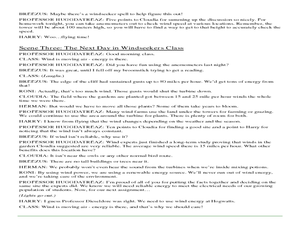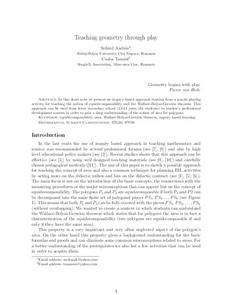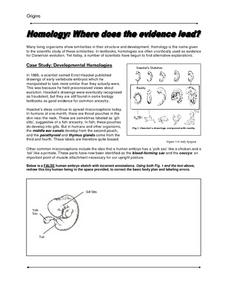Curated OER
Introduction To the Classification of Organisms
Students discuss how scientists classify organisms. In pairs, they analyze and label "specimens" of breakfast cereals in order to classify them into the correct group. They create a dichotomous key for several species of animals.
Curated OER
"Zoophyla"
Ninth graders gain an understanding of organims based on charateristics. They study about Kingdom Animalia and use technology to present knowledge of phyla. Finally, they create a new animal species of their own. When others present,...
Curated OER
Amphibians-Frog Dissection
Learners compare the anatomy of a fish to an amphibian and that of an amphibian (frog) to a human. They complete a virtual frog dissection to gain some experience prior to the real dissection.
Curated OER
How Do You Dew?
Students examine how the processes of condensation and evaporation occur. They describe the relationship between heat energy, evaporation and condensation of water on Earth. They give examples of the processes of evaporation and...
Curated OER
Earth's Seasons
Sixth graders review the relationship between the Sun and the Earth. In groups, they use a globe and flashlights to show the shadows on the Earth during the different seasons. To end the lesson, they write in their journals about their...
Curated OER
Draw a Scientist
Students think to themselves about what a scientist might look like when they're working and then draw a picture of a scientist at work and discuss their drawings. They notice the number of men compared to women and other such...
Curated OER
Energy Play: Harry Spotter and the Chamber of Windy Myths
Students explore the concept of renewable energy. In this alternative energy lesson, students participate in a play that conveys information regarding wind energy. The script may be performed as a play with props or as a reader's theatre.
Curated OER
Electron Arrangements
Students write electron configurations and identify groups. In this investigative lesson students use valence electrons to draw electron dot structures.
Curated OER
Physical and Chemical Changes
Students examine the different changes in matter. In this chemical change lesson plan students determine the amount of reactant made in a reaction using the law of conservation.
Curated OER
Mosquito Bites
Students examine malaria. In this malaria lesson, students visit selected websites to watch videos and read information about how malaria is spread and how it can be prevented. Students use their findings to launch their own awareness...
Curated OER
Should We Hunt the Largest Animals on the Planet?
Students discover details about whaling. In this environmental stewardship instructional activity, students research selected websites to locate information about commercial whaling and its implications.
Curated OER
Dinosaurs
In this dinosaur worksheet, learners focus on the myths associated with dinosaurs. Students complete 4 fill in the blank questions using the interactive drop down menu for each and a word search.
Curated OER
Aphids and Ladybirds
High schoolers record observations of ladybird beetles and aphids. They develop questions concerning the behavior of ladybird beetles and aphids that are testable by a classroom experimentation. Students develop an investigation.
Curated OER
Sugar and Light
Learners connect starch to sugar as the storage form of energy. They find that no starch is produced in the plant without light. Students perform the old favorite of looking at starch deposition in geranium leaves using Lugol's iodine...
Curated OER
Reel in Learning with Reptiles
Whether it’s all about a Jackson Chameleon or a North American Bearded Lizard, learners will be eager to embark on informational text with reptiles.
Curated OER
Facts about Indigenous people Jigsaw
Students examine facts which address common myths and misconceptions. They recognize the resulting racism, prejudice and discrimination. Students brainstorm for common myths based on the stereotyping of Indigenous people.
Curated OER
Electronic Mail the Postman Delivers
Students practice E-mail programsto access information about math and science resources.
Mascil Project
Teaching Geometry Through Play
Puzzle your way through to a new understanding of area. Scholars learn about the area of polygons through equidecomposability, the idea that polygons that can be decomposed into the same set of pieces have the same area. By using...
Curated OER
Let's Make Waves
Students investigate the concept of waves and how they are formed. The force of wind is demonstrated as the prime factor to the creation of ocean waves. Students research the concept in detail for better comprehension.
Curated OER
Warm Me Up!
Third graders explore and identify heat sources. They conduct an experiment involving thermometers and articles of clothing, and record and discuss the results.
Curated OER
Falling
Young scholars should describe the path that the motion would take as well as what might begin or stop the motion. The common characteristic of all the motions that students have experienced directly is that one or more forces are acting...
Curated OER
It's Hot
Third graders examine the effect of sunlight on the earth. Individually, they pick an article of clothing out of a bag and sort themselves based on the color of the shirt and whether it should be worn on a cold or a hot day. To end the...
Curated OER
Homology: Where Does The Evidence Lead
High schoolers are introduced to the topic of homology. In groups, they read a case study and compare different drawings of early vertebrate emryos. They work together to answer discussion questions and label the various parts of each...
Curated OER
The Flat Earth
High schoolers are first presented with the idea that the Earth is really flat. They prove that it is not--using a variety of techniques.

























